THANKS to Tom McCourt & the Tibbetts Family.
For years, I have been watching Moab move farther and farther away from its roots, to the point where it seems few people even know the history of the place anymore. Some of them don’t know OR care, but I think there are still many who have a respect for the past (I hope so, at least).Last winter I read Tom McCourt’s book on Bill Tibbetts and think it’s his finest work. I knew a bit about Bill,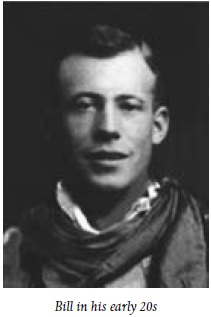 but the story was told so beautifully and I felt it was a very moving tribute, not just to Bill, but to those far off times.I see Moab as some alien world now, and I feel the most significant contribution I can make with the Zephyr these days, is to try and preserve the past in some fashion, or at least make it available for those readers who are interested. With Tom’s permission, the Canyonlands Natural History Association who published it, and with the good wishes and approval of Bill Tibbetts’ son Ray and the Tibbetts Family, we are pleased and honored to offer, over the next few months, excerpts from Tom’s excellent portrayal of ‘the Last Robbers Roost Outlaw.” JS
but the story was told so beautifully and I felt it was a very moving tribute, not just to Bill, but to those far off times.I see Moab as some alien world now, and I feel the most significant contribution I can make with the Zephyr these days, is to try and preserve the past in some fashion, or at least make it available for those readers who are interested. With Tom’s permission, the Canyonlands Natural History Association who published it, and with the good wishes and approval of Bill Tibbetts’ son Ray and the Tibbetts Family, we are pleased and honored to offer, over the next few months, excerpts from Tom’s excellent portrayal of ‘the Last Robbers Roost Outlaw.” JS
The first blush of spring brought new colors of life to the Robbers Roost country. A bright sun warmed the yellow sand and the cactus and sage began to blossom. The red rocks and blue sky became clean and bright again. Even the pinyon and juniper trees stood taller and greener as they reached for the welcoming sun with open arms. The cold, miserable winter was finally over.
The last of the Robbers Roost outlaws welcomed the warmer weather, but they knew they were entering a new and dangerous time. The ranchers over on the Big Flat were stirred up like a nest of hornets, and with green grass and longer days, the lawmen would soon be out in force. The boys knew they would be hunted like rabid wolves. They cleaned their guns and kept a sharp eye out.
They spotted the rider coming from a few miles away. The man was alone and he stayed out in the open where he could easily be seen. It was obvious that he wanted the outlaws to spot him, and they were quickly convinced that it had to be Uncle Ephraim. They were right.
As the horseman came along the top of a ridge, trying to skyline himself to be better seen, the outlaws stepped out from behind some rocks. Each had a bandana tied around his nose and mouth and they had guns in their hands.
“Halt! Who goes there?” Bill challenged, delighted to have gotten the drop on the older man this time.
Eph pulled up his horse and rolled his eyes impatiently. The boys laughed and pulled off their robber’s masks.
Then Eph said, very sarcastically, “It’s about time. I nearly rode this horse to death tryin’ to get yer attention. I was beginnin’ to think you boys might have left the country. Didn’t look like you’d been at the old cave for quite some time.”
“Yeah, we moved to a new location a month or so ago,” Bill said as he holstered his .44 and reached out to shake his uncle’s hand. “Our new cave is a little more secluded.”
“Well, take me to your new camp,” Eph said eagerly. “I’m still damp from crossin’ the river and damn near froze to death.”
At the new outlaw camp, Eph thawed out by the fire and then he got down to business. “What the hell you boys been up to? I been hearin’ some awful rumors around town.”
“What ya been hearin’?” Bill asked with a wicked smile.
“I’ve heard the big outfits have been losing a whole lot of stock,” Eph said with an anxious brow. “I’ve heard they’ve been findin’ dead cows floatin’ down the river. I’ve heard they’ve been findin’ cattle stranded on sandbars ten miles down the canyon. They say all the cows on the Big Flat have been mixed up and scattered from the Island all the way to the Book Cliffs. They tell me they been findin’ cows boxed-in under the ledges.”
“Was you the guy who did all of that, Bill?”
“It was purdy cold up there on the Big Flat and I thought some of those cows might like to go to sunny California,” Bill grinned.
“Well, I guess you got even, all right, but you sure messed up your chances for gettin’ the law on your side.”
“To hell with them,” Bill growled. “The law’s never been on my side, anyway.”
“It’s too bad you feel that way,” Eph said, rather sadly. “Cause I’ve been tryin’ to negotiate a surrender so you boys could get this mess all cleaned up. But now you got no chance. They’re gonna come for you this summer, and they’ve been talkin’ about hirin’ one of those airplanes.”
For a while they all stood around the fire in silence as the full weight of what Eph had just said soaked into their personal reality. They could hide from the sheriff and run from a posse, but they couldn’t evade eyes in the sky. The prospects for their future were suddenly very grim.
“How’re they tellin’ the story in the newspaper?” Tom Perkins asked, trying to lighten things up a bit. “Is ol’ Deputy Beach still a hero?
“They haven’t had a word about it in the newspaper,” Eph informed him. “And that’s what’s scary about this. Everything I’ve heard I got from the pool hall and the barbershop. I think they’re keepin’ it out of the paper because it’s got real personal now. I think they’re plannin’ to kill you boys.”
Later that night, the fugitives sat around the campfire enjoying some of the coffee and sugar Eph had brought in his saddlebags. A big moon moved silently across the sky and silver shadows rippled over the ledges and through the trees. Far off down the ridge a coyote yipped impatiently, the sound echoing in the canyons.
“Do ya really think they’ll bring an airplane?”
“I think they’ll do it,” came the answer from Uncle Eph. “And I wouldn’t be surprised if they don’t get some help from the governor. Some of those guys donate political money to buy the ear and sympathies of heavyweight politicians. I’m sure they’re callin’ in their markers already. They might have some state and federal marshals here in a few weeks. If I were you boys, I’d get the hell outta here while you still can.”
“Yeah, I guess you’re right,” Bill conceded. “This thing’s gotten way out of hand.”
For a while, no one spoke. The fire popped and crackled. The distant coyote moaned like the wind in the ledges.
“Even if they don’t kill you, you might end up spending fifteen or twenty years in the state pen.” Eph said. “They know you pushed those cows in the river and they won’t let you get away with it. It doesn’t matter anymore what they did. They’ve got the law ridin’ with them, and probably the governor, too.”
Over the next few days, they were able to make a deal. Bill signed over his T-4 brand and all of his cattle to Uncle Eph. Ephraim gave Bill all of the money he had with him at the time and promised to pay a fair market price for Bill’s cows once he was able to figure out how many were left. He would deposit the money in a joint account in the Moab bank. It would be there for Bill when he could get back to claim it. Eph promised to take care of Bill’s mother’s cows and pasture old Ute until Bill could come back for him.
A few days later, in the middle of the night, a couple of hobos snuck aboard an empty boxcar at the railroad siding in Thompson Springs. The train had stopped to take on water and coal. She was pointed toward Colorado. Ephraim stood near the railcar holding the reins of three horses as he told the boys goodbye. Bill reached out and patted old Ute on the cheek and told him to be a good horse until he got back.
Then the train whistle squealed and great billows of steam and smoke belched out over the nighttime prairie as connectors popped and big wheels squeaked and started to turn. A long, rolling tremor rattled down the length of the train as the engine huffed and puffed and started to move, grinding iron wheels on cold iron rails.
“You boys take care of yourselves,” Ephraim called as the boxcar began to move away.
“Kiss my mother for me,” Bill called back.
“You kiss my ass,” Ephraim hollered above the noise of the puffing engine.
The outlaws and Uncle Ephraim were all laughing as the train pulled away. Eph stood holding the horses until the train was well down the track. He then stepped up into the saddle and turned the horses toward the desert. He had to hide the extra saddles before the sheriff figured things out.
The boys made their way to Kansas. There they got work on a big farm. The farmer told them he was hiring full-time farmhands, and they soon found out what full-time employment meant to a Kansas farmer. The only time they had off was when they were eating or sleeping. The farmer kept them busy for twelve to fourteen hours a day, seven days a week.
It didn’t take long to get all of the Kansas farming they wanted, and the fugitives migrated to Oklahoma. There they ended up picking cotton and doing farm work again near the little town of Watonga in the west central part of the state. There were a lot of cowboys in Oklahoma, and amateur rodeos were popular events. By competing in the rodeos, Bill was able to supplement his income, and because of his skill and daring, he became a local celebrity known as “Cowboy Jim Lee.” Jim Lee was the alias he used while hiding from the law.
In Oklahoma, Bill met a young woman who changed everything. She was a pretty girl, the daughter of a shopkeeper. Her father owned the Agens Mercantile in Watonga. Jewel Agens worked with her father and she was the main attraction in town for many of the young men of the area. There were always a few moonstruck young fellows hanging around the store like stray cats.
Cowboy Jim Lee was different. He was cool, confident, and infinitely more mature than the stray cats. And he was a rodeo star, a true American hero. The Agens Mercantile had some old posters of Buffalo Bill’s Wild West Show hanging on the wall, and Cowboy Jim Lee looked and acted like he had just stepped out of the poster. He was handsome, tough, and he always dressed the part.
The young cowboy stopped by the store often and he was a careful shopper. He always talked with Jewel for a few minutes before deciding on his purchase. Jewel was a good sales lady and she sold him all kinds of goods, even things he didn’t really need. They would talk, Jewel would giggle, and sometimes the young cowboy would blush. They got to know each other very well. Bill was polite but evasive when she tried to pin him down about his family and his origins.
Bill had always been something of a lady’s man with his rugged good looks and manly manners, and the Oklahoma prairie flower was charmed by the attentions of the rough and tumble cowboy with the mysterious past. Betty Jewel Agens married Cowboy Jim Lee in 1926. He was 28 and she was 23.
Jewel was a good wife for Bill. She loved the man and always stood by him. She held his trust, his love,  and the secrets of his heart as her treasures. She was also strong, healthy, and full of life, the kind of woman who could follow him anywhere.
and the secrets of his heart as her treasures. She was also strong, healthy, and full of life, the kind of woman who could follow him anywhere.
As for Bill, he was completely devoted to Jewel. In her he found the love, compassion, and strong bond of family togetherness that was denied him during his troubled childhood. In her loving care, the wild man of the desert became a devoted husband, father, and grandfather. Jewel, the prairie flower, could tame him.
For most of two years the newlyweds lived in Watonga. Then, in 1928, Bill, Jewel, and Tom Perkins moved to New Mexico. Bill was looking for better opportunities to provide for his family. Working on other people’s farms and riding in rodeos didn’t promise much of a future for a family man who had just turned 30. The family was growing, too. His son, William Robert, had been born in 1927 and Jewel would soon have another baby.
They lived in Santa Fe and the men made their living breaking horses for the New Mexico State Police. Bill was confident, competent, and outgoing, and he got along well with the state troopers. No one suspected he was a fugitive from justice. As a state employee and New Mexico’s top horse wrangler, the cowboy Jim Lee became good friends with New Mexico’s governor, Richard C. Dillon. But times were changing and the police were buying more and more automobiles and fewer and fewer horses. Soon, the boys had to find work elsewhere.
Bill and Tom found jobs with the San Busco Lumber Company in Santa Fe. They saved their money, and in a short time they were able to make down payments on ranches of their own. As Jim Lee, Bill bought an old Spanish ranch called The Tarrion. He subdivided the land and made a handsome profit.
Tom Perkins bought some old Spanish ranch property, too, and soon had some good luck and some bad luck. Tom found a small iron pot full of Spanish gold coins buried in the walls of an old adobe building he was tearing down. But when he took his glittering good fortune to town to show his friends, the State of New Mexico confiscated his find. He was told there was a law on the books that buried Spanish treasure belonged to the state.
In 1930, Bill’s mother received a letter from a Mr. James Lee. The letter was postmarked Santa Fe, New Mexico. Inside she found the first news of her wayward son in over five years. He told her he was married, a father, in good health, and doing well in his new surroundings. He invited her to visit sunny New Mexico to meet his bride and two young sons.
Amy was delighted to hear from her oldest boy. She had almost given up hope of ever hearing from him again. Amy and Uncle Ephraim made the journey to Santa Fe where they enjoyed a long overdue reunion.
“It’s sure good to see you, Bill.” Ephraim said as he sat in the shade of the grape vines on the veranda. I’m happy to see you’ve done so good. I was worried about you and Tom, never knowin’ how things turned out and all.”
“Yeah, we’ve both done good,” Bill smiled proudly.
“Have another glass of lemonade,” Bill said, as he opened another bottle of beer.
“So tell me, Eph, did the sheriff ever send that airplane out on the Roost to find me and Tom?”
“He did,” Eph responded. “That airplane buzzed around out there for most of a week. They flew right over me two or three times, scared the hell out of old Sugarfoot. Funny thing, though,nothin’ was ever in the newspaper about it.”
“I guess we got out of there just in time,” Bill said soberly.
“Are you figurin’ to move back to Moab one of these days?”
“Can’t for another couple of years,” Bill explained. “The way I understand it, the statute of limitations runs out after seven years. The warrant for my jailbreak and trouble with the sheriff was issued in September 1924. I better not show my face up there till at least 1932. That’ll give the warrant a few extra months to run out.”
“Hell, I think they’ve quit lookin’ for you.” Eph said.
“Oh, I don’t know. Old man Beach and John Jackson are probably still on the prod. I don’t think those two old buzzards will give up that easy.”
“Beach doesn’t live in Moab anymore,” Ephraim said. “He sold out not long after you and Tom went to Kansas. I don’t know where he ended up, Arizona, maybe.”
“I’ll be damned,” Bill shrugged. “I didn’t know about that. What’s old John Jackson doin’?”
“He’s still runnin’ a few cows over on Ten Mile,” Eph smiled. “He pulled all of his stock off the Big Flat after you gave most of ‘em a bath. He was half the summer that year gatherin’ up stragglers down along the river there. It was a hell of a mess. We still find a lonesome old cow down there once in a while still wearin’ his brand.”
Bill laughed out loud. “Serves him right,” he said as he clapped his hands with delight.
“Jackson is makin’ most of his livin’ nowadays as a moneylender,” Eph said.
“You mean a banker?”
“No, a moneylender, like they used to have in the old days. For a little collateral and ten percent interest, he’ll lend money to almost anyone.”
“You don’t say,” Bill mused.
“What happened to the rest of the cowmen over on the Big Flat?”
“Taylors quit and sold out,” Eph said. “Patterson moved everything down to Lisbon Valley in San Juan County. The Snyder-Riordan outfit pulled out and went to Colorado. The Murphys are still hangin’ on, but the outfit ain’t nothin’ like it used to be. I don’t think they’ll make another year.”
“And how are you and Mother doin’ in the cattle business?”
“Aw, darn it, Bill. I didn’t want to talk about that yet.”
“Why not?” Bill asked with an anxious brow. He pulled his chair a little closer to the older man and asked again. “Why not, Eph?”
“Well, I hope you’re not mad, but I sold out last year,” Eph said as he fidgeted with his shirt collar and loosened his necktie just a touch. “I sold the whole shebang. All my cows and all the rights to my rangeland. Sold out to a guy named Art Murry. He moved the whole show up on the Big Flat.”
“What about Mother’s cows?”
“She sold out, too, Bill. She’s still got a few, but Kenny is takin’ care of ‘em now. He’s got her stock and his’ up on the Big Flat.”
“Kenny is just a kid.”
“Yeah, but he’s a damn good cowboy. If he keeps goin’ he’ll own five hundred head by the time he’s twenty.”
“So why did you quit, Eph?”
“I’m 51 years old, Bill. That’s half a century. I got gout and arthritis. I just couldn’t take crossin’ that darn river no more. When I sleep on the ground I get so damn stove-up it’s noon before I can get in the saddle. I’m afraid one of these days one of those old wrangs is gonna buck me off and nobody will ever find my bones out there on that desert. It was just time to quit, Bill.”
“Whatever happened to the money you was goin’ to pay me for my stock?” Bill asked.
“I got it with me,” Ephraim smiled. “A few thousand dollars and change. It’s been in the bank in Moab since you left town.”
The men were interrupted when the women came from inside of the house. Jewel walked over and put her arms around Bill’s neck. She leaned forward, kissed him on the forehead, and said, “Your mother has been telling me all about your life, Bill.”
“Aw, I already told you most of that stuff.”
“You did,” Jewel purred, “but you sure left out a lot.”
“What can I say?” Bill blushed, giving his mother a scolding look.
“We’ve got to do something before your mother goes back home,” Jewel said.
“What’s that?”
“We’ve got to get married.”
“We already are married.”
“I married a man named Jim Lee,” Jewel said with a sweet but menacing tone. “I’d rather be married to Bill Tibbetts.”
“Well, maybe we can get your minister to….”
“Absolutely not.” Jewel interrupted. “We got married in a Baptist church last time. I’m not going down there with two little kids and tell the minister I want to get married. You’re going to find a justice of the peace somewhere who doesn’t know either one of us.”
“Oh, all right,” Bill grinned.
Ephraim got up and walked away to keep from laughing.
Two days later, Mrs. Jim Lee became Mrs. Bill Tibbetts. Bill’s mother was the maid of honor and Uncle Ephraim the best man.
Jewel loved her role as a wife and mother. She doted over her husband and family, and she was a very busy young homemaker. Her four sons were born in the space of six years: William Robert in 1927, Jimmy Willard in 1929, Rodney Gail in 1930, and Raymond Moore in 1932.



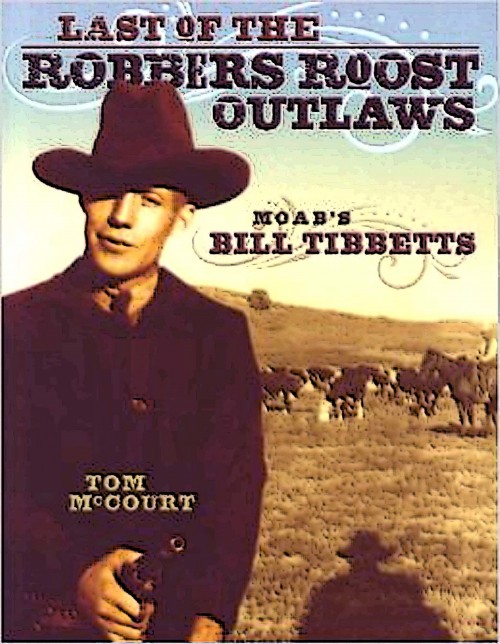
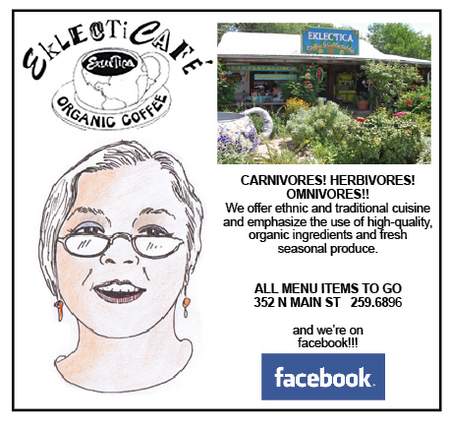

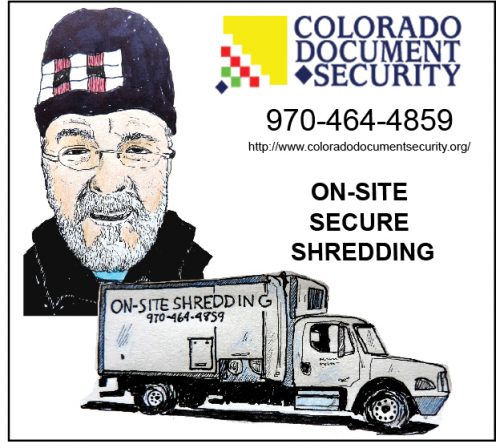


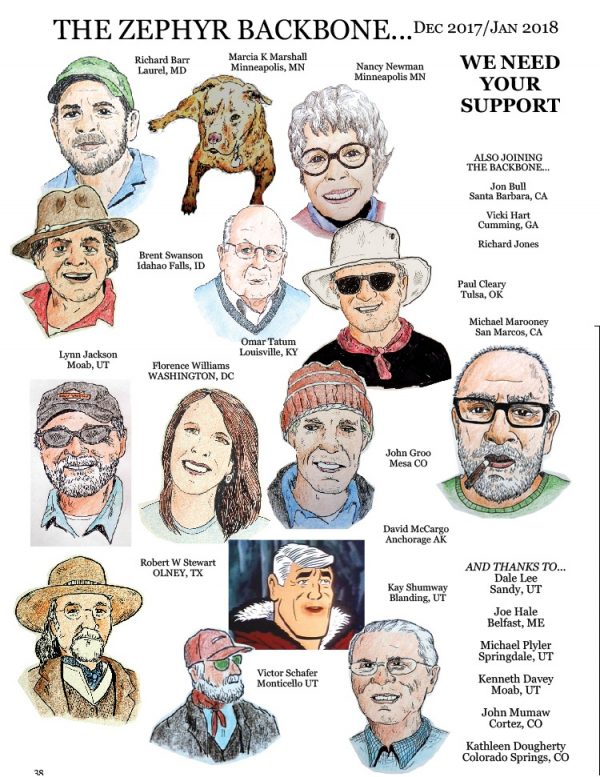
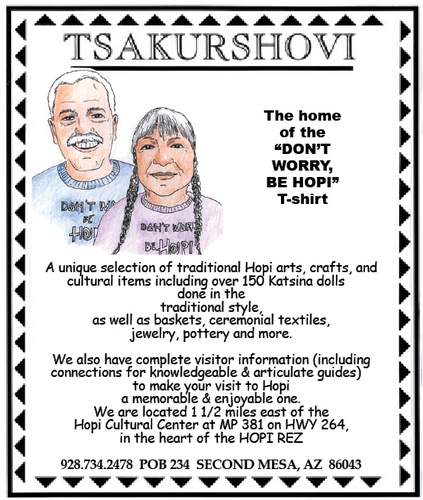
Dec 19, 2017: Have just finished reading Tom McCourt’s book, LAST OF THE ROBBERS ROOST OUTLAWS, Moab’s Bill Tibbetts, and really enjoyed the read. I’m also a published western writer and would love to pass along my congratulations to Tom McCourt for his excellent work on the book. Loved every page. And I have visited the Canyon Lands area twice in recent years.
Jim Williams…
I write under the name Big Jim Williams. I have several novels and many short stories to my credit. My latest short stories on in the just released book, BEST OF THE WEST (Sundown Press). My email is: bigjimwilliams2@cox.net.